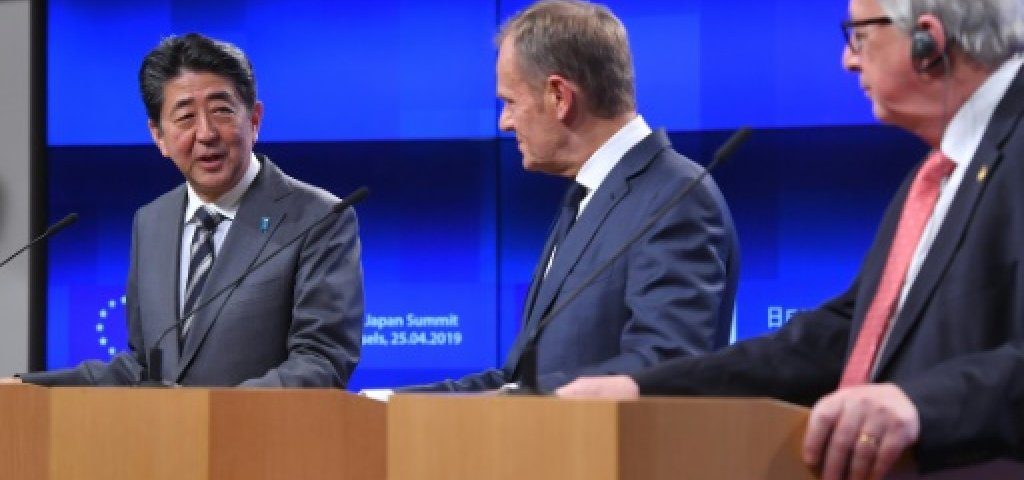Japan’s Prime Minister Shinzo Abe said Thursday a no-deal Brexit must be avoided “by all means” as Japanese firms have used Britain as the gateway to Europe and need order to continue doing business.
Abe was in Brussels following an April 11 summit in which EU leaders gave Prime Minister Theresa May another six months to get Britain’s parliament to endorse the exit terms she struck last year.
“A no-deal Brexit is what we have to avoid by all means,” Abe told a press conference in Brussels with EU leaders Donald Tusk and Jean-Claude Juncker standing at his side.
An orderly withdrawal, he said, is necessary because Japanese firms have invested so much in Britain as a European Union member country.
The companies, Abe said, need “legal stability” as well as transparency ahead.
“We strongly hope that it will be possible for Japanese companies to continue” doing business in the United Kingdom, Abe said, speaking through an interpreter.
“For Japan, the UK is the gateway to Europe,” he said, recalling he has made the same point to Juncker, Tusk and May. “So a smooth Brexit is what we hope for.”
Analysts have warned that the negotiations for Britain’s exit have in many cases accelerated the decisions of Japanese firms to leave Britain.
During their April 11 summit, European Union leaders agreed with May to delay Brexit by up to October 31, saving the continent from what could have been a chaotic no-deal departure on April 12.
– ‘Rules-based’ order –
The April 12 deadline was already a delay from an original deadline of March 29.
The EU granted the postponements after May failed three times to get the British parliament to adopt the divorce deal she struck in Brussels last November.
If London remains in the EU after May 22 then British voters will have to take part in European elections — or crash out of the European Union on June 1.
Around 1,000 Japanese companies operate in Britain, supporting about 140,000 jobs.
But automakers Honda and Nissan have said they are axing production at plants in Britain, while electronics giants Sony and Panasonic are scaling back operations and major Japanese banks are pulling out.
While there are specific reasons behind each individual business decision, analysts say the spectre of Brexit is haunting Japanese firms across the board.
Juncker, who heads the EU’s executive arm, the European Commission, and Tusk, who organises EU summits as European Council president, issued a joint statement with Abe pledging broad cooperation.
“The EU and Japan will work together at the G7 and G20 in support of the rules-based international order,” the statement said.
They were alluding to ally Washington’s retreat from multilateral cooperation under US President Donald Trump’s “America First” approach.
They pledged to “ensure the success of the June G20 Summit in Osaka, by upholding shared values,” according to the statement.
“We reiterate our commitment to keeping markets open and to strengthening the rules-based multilateral trading system with WTO as its core,” it said.
Japan and the EU earlier this year launched the world’s biggest free trade zone, covering more than 630 million people and economies that represent a third of global GDP.AFP




